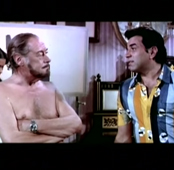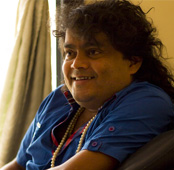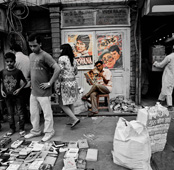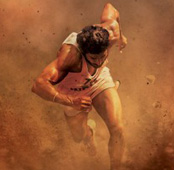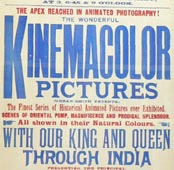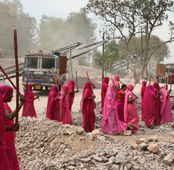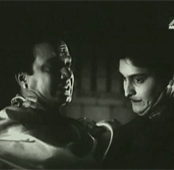-
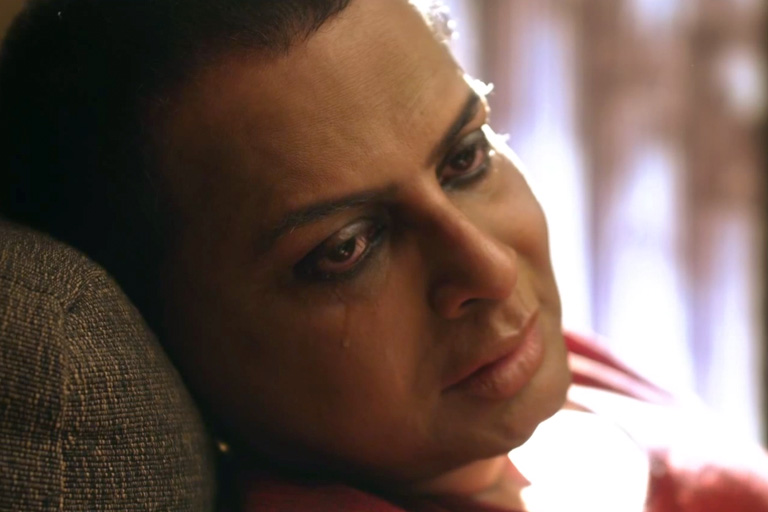 Rituparno Ghosh in Chitrangadha (2012)
Rituparno Ghosh in Chitrangadha (2012) -
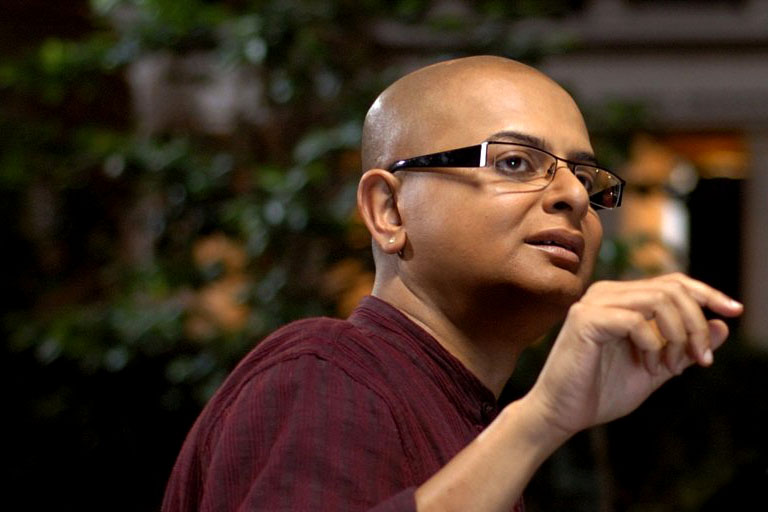 Rituparno Ghosh in Memories in March (2010)
Rituparno Ghosh in Memories in March (2010) -
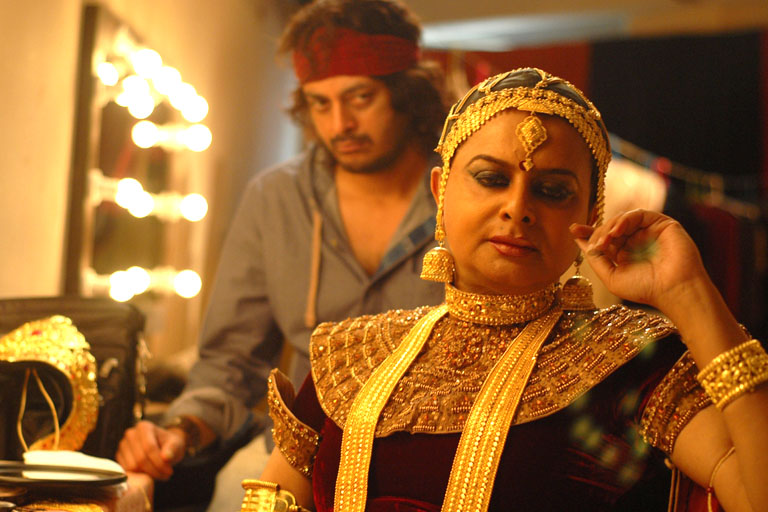 Rituparno Ghosh in Chitrangadha (2012)
Rituparno Ghosh in Chitrangadha (2012)
Aparna Sen on her friend Rituparno Ghosh’s quest, journey and cinema
I first met him in the late 1980s when he was 20 something and a copywriter at Ram Ray’s advertising agency Response. Ram, an old friend, called me up one day. “I’m sending a young chap across. Writes rather well. Can you find some time to listen to a film script he’s written?”
So that was how Rituparno Ghosh came over to our Alipur apartment one morning in 1986, a slightly plump, curly haired young man in jeans and T-shirt, with huge glasses on, bright eyes shining behind thick lenses, a far cry from the style icon that he had developed into later.
Ritu ended up becoming not only a close friend, but also someone akin to a brother.
The script he read out was about Radha and Krishna. A bit over-lyricized I felt, but extremely detailed and very well written. I knew straightaway that the young person sitting across the room from me was a major talent, knew without a doubt that he would go far. What I did not know was that he was already a star of sorts in Ram Ray’s copywriting team, and had created lines like “Boroline Chirodin” for Boroline and “Tawker Aapon Jon” for Margo soap. I asked him if he would like to collaborate with me on my scripts and he agreed readily.
We never did collaborate after all. Every time he came, we would end up chatting. For hours on end. About everything under the sun. Films, poetry, Tagore, Satyajit Ray, Bergman, Kurosawa, the Tollygunge film industry, Uttam Kumar, Soumitra Chatterjee, my experiences as an actress… We enjoyed these sessions hugely! So much so, that soon he began to accompany me to shoots, to poetry recitals where I sometimes performed, to rehearsals of stage plays that I was then acting in, and even when I went shopping. Or we’d simply hang out at home, swapping story ideas for future films. Sometimes he would help Konkona, then a little girl, with her Bengali grammar or he’d sit with me through a script narration. Afterwards, we’d discuss the merits and demerits of the script we’d just heard. He always had something very insightful to say, and I benefited greatly from his sharp intelligence, often turning down or accepting a film offer on the strength of his comments. And, of course, we read our own scripts out to each other, although he was far more prolific than I was. I had heard many of his scripts long before they were made into films— Hirer Angti, Unishey April, Dahan, Ashukh, Khela (then titled Nalok), Titli, Chokher Bali…
Ritu had said to me once that if he had a piece of blank paper in front of him, he felt an insatiable urge to fill it up with words. In later years, he had once gone to a film festival where the hospitality was terrible. He found himself in a hotel room without food and with no money to buy a meal. There were packets of coffee, however, and an electric kettle. He made himself endless cups of coffee and, in order to distract himself from thoughts of food, drew out the notepaper supplied in the room and started writing. That was how the script of Ashukh got written. I felt that his facility with words was both a blessing and a curse, and told him as much. Interesting and well-written dialogue came so easily to him that he tended to make his films verbose unless checked. He would often fall in love with the dialogue he had written and continue a conversation between two people endlessly and effortlessly. I often played the role of conscience with him and he insisted that I do. This was one of Ritu’s qualities that I never tired of admiring. He could take criticism with an open mind and never held a grudge. If he didn’t agree with you, he would tell you so to your face. I believe this happens only with people who are perfectionists and who have a strong self-image. It is only when artists are unsure of their ability that they become defensive and vulnerable to criticism. In any case, our friendship was too important to both of us to risk jeopardizing with intellectual dishonesty. If I lied to him to spare his feelings, he would know instantly, just as I would with him. This was part of our comfort zone with each other. We knew that we could always be sure of brutal frankness. I think our respect for each other would have been diminished had it been otherwise. So I told him about something Satyajit Ray would do as an intellectual exercise— use dialogue in a scene only if it were impossible to communicate an idea through visual means. After that, both Ritu and I would keep trying to do this in our own scripts, even though we didn’t always succeed.
Ritu also had an insatiable curiosity about everything. In my case, he was curious about the saris I wore, my hairstyles, my make-up, my interior decoration, my relationship with my daughters, everything. I realize now that he was then a director in the making, soaking up every experience around him like a sponge. I happened to tell him about my guilt because I couldn’t give my daughters enough time, and that my elder daughter had once said, “I kept waiting for you to find time, till one day I discovered that I had grown up!” I realized how intently Ritu had been listening to all my confidences the day I first heard the script of Unishey April. He had put those exact words in Debashree’s mouth: “Tomar jonye wait korte korte I grew up Ma.” People go to film school to learn film direction. I don’t think film direction can be taught. You can learn about framing, lenses, lighting, photography, editing, and so on— but in order to be a director, you have to take your lessons from life itself. Ritu was doing just that.
Hirer Angti, Ritu’s first film, was produced by the Children’s Film Society. Shabana Azmi was then heading it, so Ritu asked me to write a letter of introduction for him to Shabana. He came back to Kolkata not only with the contract for the film tucked firmly under his belt, but he had also laid the groundwork for a lifelong friendship with the Bachchan family during his trip to Mumbai. That was another one of his many wonderful qualities— his personal charm. He could bond effortlessly with almost anyone and this stood him in very good stead in his career as a filmmaker. His relationships with people may not always have been entirely free of trouble, but his charm was not facile; Ritu was genuinely interested in people—how they lived, how their minds worked—and his sensitivity, combined with his considerable intelligence, allowed him to get to the core of almost anything, be it a human being or an idea.
In later years he had earned the reputation of directing his actors minutely, sometimes even asking some of them to imitate him. But I never saw that side of him. Although he was a very good actor himself, in Unishey April he left me largely to my own devices. Of course, I knew the screenplay inside out. In many senses it had become mine as much as his after our endless, detailed discussions about it. Interestingly, Ritu asked me to decorate Sarojini’s (my character in the film) bedroom set. I now realize that it was a director’s device to get his actor to identify with the character— an acting workshop of sorts. Unishey April forged a strong bond between Ritu and me. We took the script to one producer after another, with me promising to act free of cost if only they would fund the project. It never ceases to amaze me that all of them, without exception, turned us down. How did they not realize its worth, being in the film business? At that time a friend called Renu Roy had suddenly got hold of some money. She suggested that she and I form a film production company and that I make its first film. But by then, I was determined to get Ritu’s film off the ground, come what may. Finally Renu, Ritu and I jointly formed Spandan Films and used the money to produce Unishey April. Most of the actors acted free of charge and everyone helped, as they often will in the case of a first film. The film won the Golden Lotus at the National Awards, and the rest is history.
I saw Ritu through many stages of his, sadly, short life. He was initially a slightly effeminate boy, but no more than that, at least not on the face of it. He still hid the fact that he was gay, although it obviously pained him to hide it from those he loved. I remember badgering him to get married and even threatened to look for a suitable girl if he couldn’t manage to find one himself. He brushed my suggestions aside lightly enough, but I was puzzled at the sadness on his face. A few days later he gave me a book of poetry to read, gifted to him by a male friend. “You do poetry recitals,” he said, “ …you might find something interesting here.” After he had left, I started turning the pages. On the flyleaf were inscribed the words “to you, from me”. Understanding dawned. I never badgered him again. But that incident broke whatever barriers of inhibition had existed between us. I became his confidante, and he mine. He began to tell me about his relationships, about the pain of the sexually marginalized, about his loneliness, about his desire to be accepted for who he was.
Gradually, as he became more and more successful as a filmmaker, he started becoming increasingly open about his sexuality. He discarded his jeans and t-shirt in favour of long flowing kurtas and handpicked scarves. He lost weight and shaved his head, looking beautifully and elegantly ascetic— a Buddhist monk in designer clothes. But he was shaping his mind too, not just his exterior. He had always been an avid reader and an early riser. Now he disciplined himself into spending those early morning hours reading and writing. He delved deep into Rabindranath Tagore who had always been an inspiration for him, developing a greater understanding of the androgynous quality of Tagore’s writing. He also loved the Mahabharata from which he had chosen his name—Rituparno—rejecting the name Shouroneel that his parents had originally given him. The androgynous characteristics of Shikhandi, Brihannala and, to some extent, Chitrangada in the Mahabharata fascinated him. His last fiction film Chitrangada was inspired both by Tagore’s play of the same name, and by the episode of Arjun and Manipur’s warrior princess Chitrangada in the epic he so loved. In a masterstroke, he envisioned Kamdeva, or Madan, of Tagore’s play as a plastic surgeon who transforms a male Chitrangada into a feminine and desirable woman, and then he went on to use that section of the play as a metaphor for a transsexual choreographer’s desire to become a woman through a sex re-assignment surgery. He also started acting in these roles himself, thus effectively blurring the line between fiction and real life. Without sending out a message, within quotes, as a lesser filmmaker might have done, Ritu managed to bring the hitherto marginalized into the domain of the mainstream, to an extent.
Ritu cannot be seen simply as a filmmaker. Indeed, I am not a hardcore fan of all his films, some of which I find more decorative than deep. He must be seen in totality— as a conglomerate of his films, his writing, his considerable scholarship, his eccentric lifestyle and his sexuality. It is as if he were creating himself from scratch in his own laboratory— right from the point of choosing his name to becoming a formidable filmmaker who flaunted his trans-sexuality with fearless aplomb.
Ritu’s presence was magnetic. His absence is no less powerful. It will take a long time to get used to it.
Chronicle of a Friendship Unforetold
ArticleJune 2013
 By Aparna Sen
By Aparna Sen
Aparna Sen, based out of Kolkata, is one of India's most acclaimed filmmakers, screenwriters and actresses. She has been editor of the Bengali magazine Sananda and Creative Director of the Bengali infotainment channel Kolkata TV. Her films, such as 36 Chowringhee Lane, Paroma, Sati, Mr. and Mrs. Iyer and 15 Park Avenue have won awards both in India and abroad. Her last film, released this year, was Goynar Baksho.



